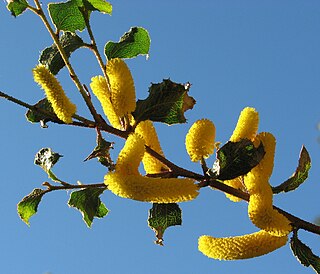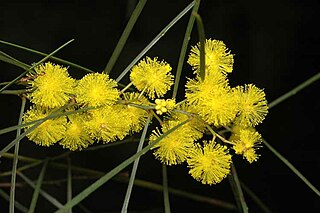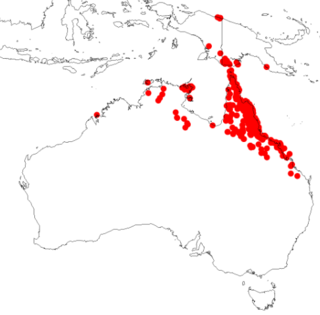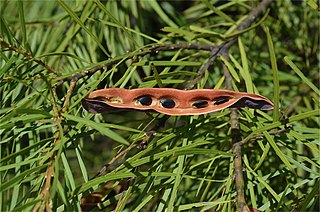
Acacia inaequilatera, commonly known as kanji bush, baderi, camel bush, fire wattle, kanyji bush or ranji bush is a tree in the family Mimosaceae. Endemic to Australia, it is widely distributed in the semi-arid Triodia country eastwards from Karratha, Western Australia into the Northern Territory.

Acacia tetragonophylla, commonly known as curara, kurara or dead finish, is a tree in the family Fabaceae that is endemic to arid and semi-arid parts of central and western Australia.

Acacia denticulosa, commonly known as sandpaper wattle, is a species of Acacia native to the south-west of Western Australia. A spindly shrub 1–4 m high, it flowers from September to October, producing dense, curved, yellow flower spikes.

Acacia prominens is a shrub or tree in the genus Acacia native to New South Wales, Australia.

Acacia longissima, known colloquially as long-leaf wattle or narrow-leaf wattle, is a species of Acacia native to eastern Australia.

Acacia spondylophylla, commonly known as curry wattle or spine-leaf wattle, is a small, flat topped shrub native to central and western Australia. The leaves, which are arranged on spaced whorls around the stem, have a distinctive curry-like smell.

Acacia hakeoides, known colloquially as hakea wattle, hakea-leaved wattle or western black wattle, is a species of flowering plant endemic to southern Australia. It is a bushy shrub or tree with lance-shaped to linear phyllodes, racemes of bright golden-yellow flowers and more or less leathery to leathery to hard and brittle pods. It can be found growing in sandy soils in semiarid and Eucalyptus woodland in the region.

Acacia acradenia, commonly known as Velvet Hill wattle and silky wattle, is a species of flowering plant in the family Fabaceae and is native to northern and central Australia. It is a spindly shrub or tree with elliptic or narrowly elliptic phyllodes, spikes of orange or golden flowers and linear, crustaceous pods. The Nyangumarta peoples know it as walypuna the Alyawarr call it ampwey, the Jaminjung and Ngaliwurru know it as mindiwirri, the Jaru as binbali or gundalyji, the Kaytetye as ampweye or arwele and the Warlpiri as ngardurrkura.

Acacia argyraea is a species of flowering plant in the family Fabaceae and is endemic to tropical parts of northern Australia. It is a shrub or tree with smooth bark, narrowly elliptic to elliptic phyllodes, spikes of pale yellow flowers in axils, and linear to lance-shaped pods up to 85 cm (33 in) long.

Acacia alexandri is a species of flowering plant in the family Fabaceae and is endemic to the Cape Range in the north-west of Western Australia. It is a glabrous shrub with slender branchlets, linear phyllodes, and cream-coloured flowers arranged in 1 or 2 spherical heads in the axils of phyllodes, and narrowly oblong, papery pods up to 70 mm (2.8 in) long.

Acacia ampliceps, commonly known as salt wattle or spring wattle, is a species of flowering plant in the family Fabaceae and is endemic to the north-west of Australia. It is a large, bushy shrub or small tree with often pendulous branches, pendulous, linear to lance-shaped phyllodes, white to cream-coloured flowers arranged in spherical heads, and pods up to 115 mm (4.5 in) long.

Acacia anthochaera, commonly known as Kimberly's wattle, is a species of flowering plant in the family Fabaceae and is endemic to Western Australia. It is a rounded shrub or tree with narrowly linear phyllodes, racemes of 4 to 9 spherical heads of bright light golden flowers, and narrowly oblong, papery pods up to 85 mm (3.3 in) long.

Acacia argutifolia, commonly known as East Barrens wattle, is a species of flowering plant in the family Fabaceae and is endemic to the south of Western Australia. It is a low, spreading, intricate shrub with linear phyllodes, spherical heads of pale yellow flowers, and narrowly oblong, somewhat papery pods up to 40 mm (1.6 in) long.

Acacia adunca, commonly known as Wallangarra wattle or cascade wattle, is a species of flowering plant in the family Fabaceae and is endemic to eastern Australia. It is an erect, bushy shrub or tree with narrowly linear phyllodes, racemes of spherical bright golden flowers, and leathery pods.

Acacia simsii is a shrub belonging to the genus Acacia in the family Fabaceae. It is native to New Guinea and northern Australia. In Australia it is found in both the Northern Territory and Queensland.

Acacia arafurica is a species of flowering plant in the family Fabaceae and is endemic to the far north of the Northern Territory. It is a shrub or tree obliquely egg-shaped to diamond-shaped phyllodes, flowers arranged in spikes of golden yellow flowers, and papery, linear pods up to 105 mm (4.1 in) long.
Acacia arbiana, commonly known as Tony's wattle, is a species of flowering plant in the family Fabaceae and is endemic to a restricted area of central-eastern Queensland. It is a spreading shrub with crowded, linear phyllodes, and single heads of golden yellow flowers, and linear, papery pods up to 450 mm (18 in) long.

Acacia asparagoides is a species of flowering plant in the family Fabaceae and is endemic to a restricted area of south-eastern New South Wales. It is an erect or spreading shrub with sharply-pointed, more or less rigid, linear phyllodes, bright yellow flowers arranged in a spherical head of 15 to 30 in axils, and narrowly oblong and curved pods up to 40 mm (1.6 in) long.

Acacia armitii is a species of flowering plant in the family Fabaceae and is endemic to north-eastern Australia. It has more or less erect, very narrowly elliptic to linear phyllodes, flowers arranged in solitary spikes in axils, and linear pods up to 55 mm (2.2 in) long.

Acacia macnuttiana, commonly known as McNutt's wattle, is a flowering plant in the family Fabaceae and is endemic to north-eastern New South Wales. It is a shrub with linear phyllodes, spherical heads of bright yellow flowers arranged in racemes in leaf axils and seeds usually in more or less straight, leathery pods.





















